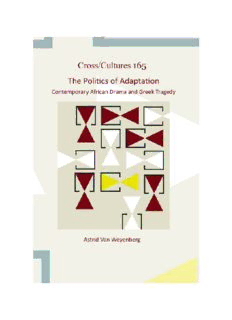
The Politics of Adaptation: Contemporary African Drama and Greek Tragedy PDF
Preview The Politics of Adaptation: Contemporary African Drama and Greek Tragedy
The Politics of Adaptation CROSS Readings in Post/Colonial ULTURES Literatures and Cultures in English 165 SERIES EDITORS Gordon Collier Bénédicte Ledent Geoffrey Davis (Giessen) (Liège) (Aachen) CO-FOUNDING EDITOR Hena Maes–Jelinek The Politics of Adaptation Contemporary African Drama and Greek Tragedy Astrid Van Weyenberg Amsterdam - New York, NY 2013 Cover Image: Falke Pisano The paper on which this book is printed meets the requirements of “ISO 9706:1994, Information and documentation - Paper for documents - Requirements for permanence”. ISBN: 978-90-420-3700-7 E-Book ISBN: 978-94-012-0957-1 © Editions Rodopi B.V., Amsterdam – New York, NY 2013 Printed in The Netherlands Instead of seeking out the “classical” on the snowy and inaccessible heights of Olympus, we should perhaps be looking for it on earth and using history to give it a name and some substance. — Salvatore Settis Contents ——————————————————————————— (cid:97) Acknowledgements ix Introduction: Contemporary African Drama and Greek Tragedy xi 1 AFRICAN ANTIGONES: “Wherever the call for freedom is heard!” 1 Antigone’s politics – The choice of Antigone – Antigone’s representation – Performing Antigone – Beyond Antigone? – Antigone’s futures 2 RITUAL AND REVOLUTION: Wole Soyinka’s Bacchae, a Yoruba Tragedy 43 (Post)colonial Thebes – Revolutionary Dionysus – Sacrifice and the mythologization of history – Yoruba and Greek: a complicated brotherhood – The terms of comparison 3 STAGING TRANSITION: The Oresteia in Post-Apartheid South Africa 91 Narrating the past –Victims and perpetrators – Theatre of witnessing and mourning – Justice: definitions and demands – The politics of reconciliation – The weight of the past 4 MOURNING REMAINS: Femi Osofisan’s Women of Owu 141 The mourning voice – Memory and promise – Gendered laments – Re/membering the past – The promise of change – Mourning others Conclusion 179 Works Cited 185 Index 201 Acknowledgements ——————————————————————————— (cid:97) I FIRST OF ALL WISH TO THANK Mieke Bal and Murat Aydemir, under whose guidance the research for this book first took shape at the Am- sterdam School for Cultural Analysis of the University of Amsterdam. I’m grateful to Lorna Hardwick and Irene de Jong for their useful feedback on my manuscript and to Mark Fleishman and Yael Farber for making the scripts of their plays available to me. My warm thanks to all the friends and col- leagues who have supported me throughout the writing process. A special word of gratitude to my dear friends Paulina Aroch Fugellie, who, more than any of the books I’ve read, opened my eyes to a wider world, and Falke Pisano, who was always there for long-distance talks and who designed the cover image for this book. Finally, I thank my family. My brothers Steven and Stijn, whom I’m glad to have by my side. My father, for always reminding me that there are different sides to every story, for challenging me in heated discussions, for smiling at my idealism, for his thirst for knowledge. My mother, for always reassuring and never failing me, for seeing the forest through the trees, for her wisdom and common sense. Bedankt. Previous versions of Chapter 1 appeared in the Journal of African Literature and Culture 4, ed. Charles Smith (2007: 59–80); in Migratory Settings, ed. Murat Aydemir and Alex Rotas (Thamyris/Intersecting: Place, Sex, and Race 19; Amsterdam: Rodopi, 2008): 119–37; in Interrogating Antigone in Post- modern Philosophy and Criticism, ed. Steve Wilmer and Audrone Zukaus- kaite (Oxford: Oxford University Press, 2010): 366–78; and in The Returns of Antigone, ed. Tina Chanter and Sean D. Kirkland (Albany: State University of New York Press, forthcoming). A previous version of Chapter 2 appeared in African Athena: New Agendas, ed. Daniel Orrells, Gurminder Bhambra, and Tessa Roynon (Classical Presences; Oxford: Oxford University Press: 2011): 32–42.
Description: